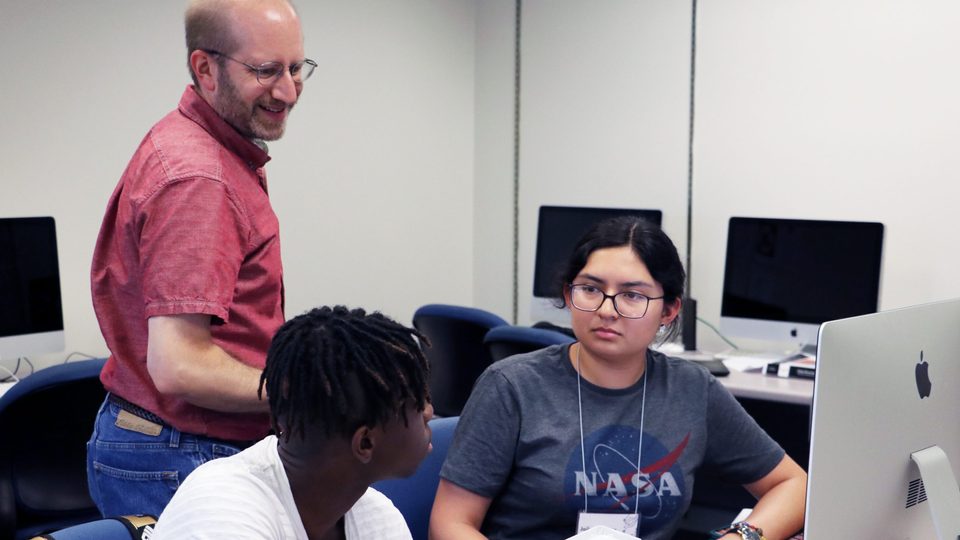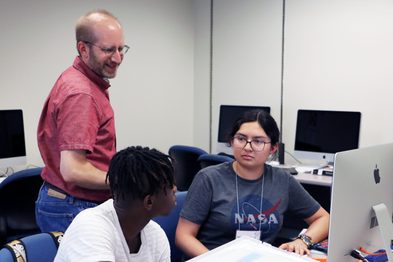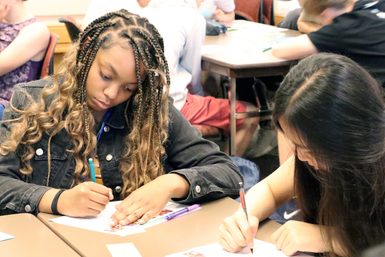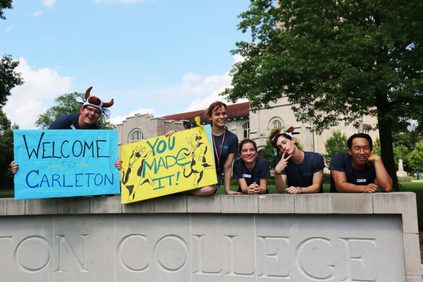Summer Academic Programs offer Carleton professors a chance to reflect on their teaching
Every summer, high school students participate in three-week Summer Academic Programs on campus taught by Carleton faculty.

 Every summer, high school students participate in three-week Summer Academic Programs on campus taught by Carleton faculty. For high schoolers, these programs are an opportunity to get a taste of college life—living in dorms, eating in the dining halls and attending classes. For Carleton faculty, the summer programs offer a chance to try out new teaching methods and make a positive impact on high school students who are beginning the college application process.
Every summer, high school students participate in three-week Summer Academic Programs on campus taught by Carleton faculty. For high schoolers, these programs are an opportunity to get a taste of college life—living in dorms, eating in the dining halls and attending classes. For Carleton faculty, the summer programs offer a chance to try out new teaching methods and make a positive impact on high school students who are beginning the college application process.
Al Montero, the Frank B. Kellogg Professor of Political Science, has directed the Summer Quantitative Reasoning Institute for seven years and returned this summer for his eighth and final year leading the program. Over the summer, Montero teaches Introduction to Comparative Politics with a lab component where students work in teams on statistically-based projects involving hypothesis testing.
During his summer class, Montero tries out new teaching ideas—such as using “new models for initiating and sustaining collective research projects”—which he then replicates in his Introduction to Comparative Politics course with Carleton students. Montero also assigns readings during the summer that he wants to read for Carleton courses, thereby preparing for the academic school year.
History professor William North also finds ways to incorporate his summer teaching into the Carleton academic year. North directs the Summer Humanities Institute, where he teaches a seminar involving an 11- to 15-page research paper, a poster presentation and an oral component.
“Because Carleton students often face very similar challenges and expectations, SHI has offered me the opportunity to reflect more deeply on this process of content teaching and individual student researchers,” North said. Furthermore, because the high schoolers in the program “come from many different kinds of high school preparation,” the institute has led North to “reflect on [his] assumptions about how students learn and work.”
 Like her colleagues, Deborah Appleman, the Hollis L. Caswell Professor of Educational Studies, uses the Summer Writing Program that she directs to refine her strengths as a teacher.
Like her colleagues, Deborah Appleman, the Hollis L. Caswell Professor of Educational Studies, uses the Summer Writing Program that she directs to refine her strengths as a teacher.
“Teaching in the Summer Writing Program really helps me think about my pedagogy in important ways,” Appleman said. “Working with high school students is a kind of cross-training, using my teaching muscles in a different way—a way that makes them stronger for the college classroom.”
Dave Musicant, a computer science professor and director of the Summer Computer Science Institute, teaches a new subject area during the summer: robotics. Nevertheless, Musicant says the robotics course is still very applicable to his Carleton courses, as he is able to “form great motivational examples” based off robotics for his trimester courses that “look at approaches for solving problems when computer memory is limited.”
Beyond the practical applications of his summer class, Musicant finds working with high schoolers to be “another entirely different experience” because he is able to “see them do all their work and help them as they get stuck.”
“I’ve been able to take what I’ve learned from watching the SCSI students work and help improve how Carleton students work in my classes,” Musicant said. For example, the institute allows Musicant the opportunity to witness pair programming in action to determine “what sorts of pairings work well and don’t work well, and what best practices help enhance the process”—knowledge that he can then apply when teaching Carleton students.
Beyond learning from their students, Summer Academic Programs faculty also learn from one another.
“Summer programs offers a kind of collaboration with other faculty that is often not possible during the hectic pace of the regular academic year,” Appleman said. “It’s wonderful to be able to share ideas and strategies with colleagues from a variety of departments, all in service to our shared high school students.”
The faculty also say they value the opportunity to introduce high school students to a college environment through the Summer Academic Programs.
 “Teaching high school students is in some ways a very different sort of experience than what I get throughout the year, and it’s neat to have an opportunity to do so,” Musicant said. While Carleton students are already at a great liberal arts college, “for some of the SCSI students, participation in the program and learning what they do can make a massive difference regarding what kind of college they can get into at all.” Therefore, Musicant believes he can “make a more dramatic difference” with the high schoolers than with Carleton students.
“Teaching high school students is in some ways a very different sort of experience than what I get throughout the year, and it’s neat to have an opportunity to do so,” Musicant said. While Carleton students are already at a great liberal arts college, “for some of the SCSI students, participation in the program and learning what they do can make a massive difference regarding what kind of college they can get into at all.” Therefore, Musicant believes he can “make a more dramatic difference” with the high schoolers than with Carleton students.
“I most look forward to seeing the growth the students go through during their three weeks with us,” Musicant added. “It’s incredible seeing how much they can learn, and how much they achieve in the projects that they undertake.”
Similarly, Montero finds it a “great privilege and responsibility” having “some influence, despite the relatively short time, on [the high school students’] pre-college decision-making and training.”
“To the extent that summer teaching allows me to experiment and innovate to allow me to do my job better during the Carleton trimesters is great, but that is just a function of being dedicated to teaching great students,” Montero said.
Appleman added: “Summer programs can help young people begin to see themselves as successful college students, and it is our job to facilitate that process by offering them sound but encouraging feedback as they develop their reading, writing and thinking skills.”
Learn more about Carleton’s Summer Academic Programs.